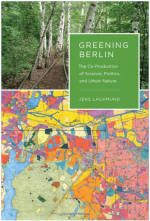 Henrik Ernstson just published a review of the book Greening Berlin by Jens Lachmund in the journal Science and Technology Studies (full review here).The book which is published by MIT Press deals about the rise of urban biodiversity protection and how urban ecological science was shaped by the place of Berlin. It starts of in post-war Berlin and traces how ecologists translate ecological field work into a political tool for urban planning.
Henrik Ernstson just published a review of the book Greening Berlin by Jens Lachmund in the journal Science and Technology Studies (full review here).The book which is published by MIT Press deals about the rise of urban biodiversity protection and how urban ecological science was shaped by the place of Berlin. It starts of in post-war Berlin and traces how ecologists translate ecological field work into a political tool for urban planning.
The two main characters of the book is urban ecologist Herbert Sukopp and Berlin itself and how they came to influence the organization of urban ecological science. From c.1960-1990, we get to follow how a small research group tries to put into action their grand vision of “urban renewal under the guidance of ecology” (p. 231). I write in my review:
The major theoretical contribution of this book lies in the textured understanding we receive on how the practice of field science is necessarily caught between a (hard) place and universalism, a theme discussed by others (Evans, 2011) but not at this length.
[Sukopp and his team’s] recording of data aimed in the 1970s towards a “comprehensive structuring of the Berlin territory” that would use statistical indicators and maps to represent Berlin as “complex flora, fauna, and living spaces” (p.59). It crucially also established “the city (or the urban ecosystem) as a generic object of ecological knowledge” (p.72), mingling place based field work with universal claims.
Lachmund pays due diligence on how the ambition to ‘map’ the whole of Berlin based on science (an explicit goal by Sukopp and his group) was fractured as the deadline for their Species Protection Programme approached in 1984. To avoid time-consuming fieldwork, “quick mapping” and a “reduced methodology” (p.105) was eventually used where “biotope types” came to basically equate with “land- use categories”, which did not explicitly or empirically take biological conditions into consideration, but nonetheless “assumed to each represent ecologically homogenous conditions” (p.105) with equal “ecological significance and conservation needs” (p.107).


